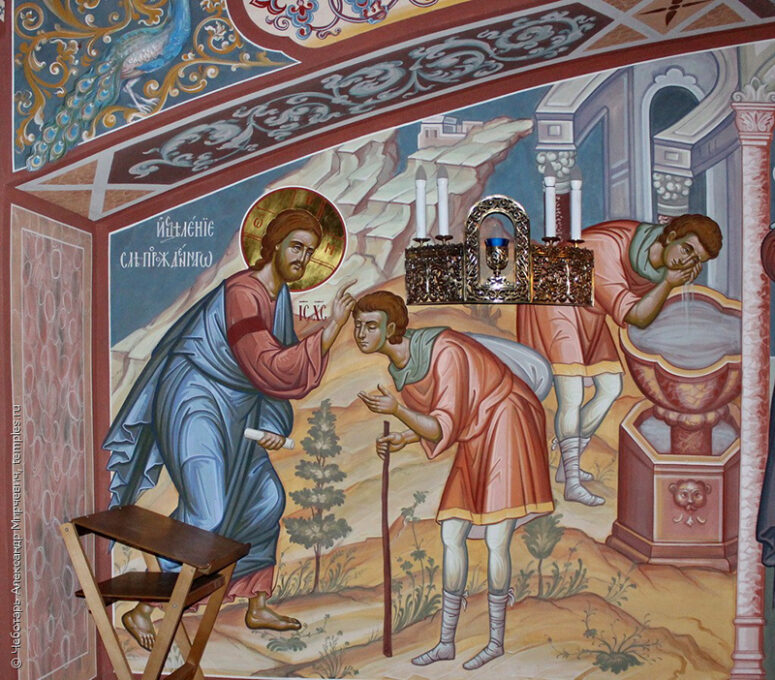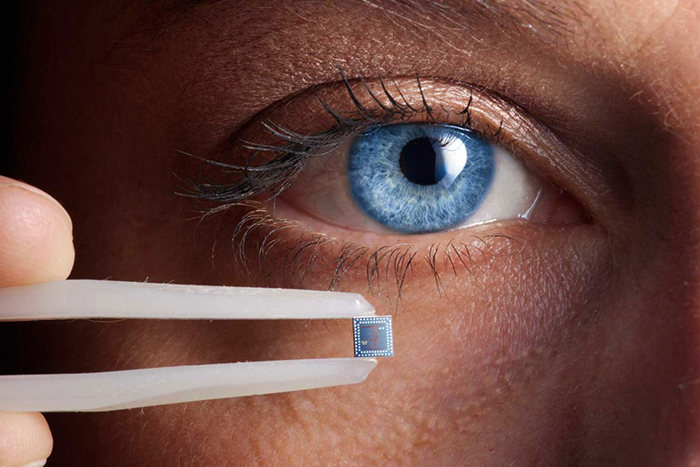
The Holy Scripture introduces us to the notion of disease when it speaks about Adam and Eve’s expulsion from Paradise. In the Book of Genesis (3:16), the Lord says to Eve: “with painful labour, you will give birth to children.” Effectively, there was no disease up until the falling from grace of the first people, but after the fall, disease becomes the harbinger of death promised to them for disobeying God.
History is replete with examples of sin engulfing every part of human activity after entering this world by the will of man. This sin turned benefit into evil. Consider bacteria, for example. Myriads of useful bacteria live inside and outside our bodies and support our lives. Perhaps they were the original creation of God coming from paradise. However, it is fully plausible that when sin entered the world, harmful bacteria and microbes appeared.
It is also a fact that people ate no meat before the Great Flood, but after it, meat became a part of the human diet. The old habit from paradise of peaceful coexistence between man and the world survived for some time, but the power of sin was growing, making humans more savage and brutal. Bacteria and viruses also evolved in structure and behaviour. The world’s living creatures abandoned their original purpose of building a better world and engaged themselves fully in the struggle for existence, as man’s falling from grace made their lives limited and finite.
Human action and behaviour have thus contributed to the origin of multiple human diseases, and this situation has continued to this day. Speaking of the causes of disease, several of them are worth separate mention.
1. Permission from God
God may permit disease in humans for many different reasons.
We find an explanation of one of these reasons in Paul’s second epistle to the Corinthians ( Therefore, to keep me from becoming conceited, I was given a thorn in my flesh, a messenger of Satan, to torment me. Three times I pleaded with the Lord to take it away from me. But he said to me, My grace is sufficient for you, for my power is made perfect in weakness.”
We find another explanation in the narration about the blind man in the Gospel of John: “His disciples asked him, “Rabbi, who sinned, this man or his parents, that he was born blind?” “Neither this man nor his parents sinned,” said Jesus, “but this happened so that the works of God might be displayed in him. John 9:2.3).

The Holy Fathers taught the faithful to see benefit in any illness permitted by God. For example, Saint Barsanuphius of Optina wrote: “Monastics should see their illness as a benefit to them. In illness, do not seek healing, but only maintenance of your condition. He also quoted the advice from the Apostle Paul, “whoever suffers in the body is done with sin.”
As we can see, God sends diseases to bring people to His Glory or to test and strengthen their faith.
2. Human sin
In the Old Testament, the Jews never looked for any visible or physical causes of disease. Instead, they sought to realise where they had sinned. They believed that by repenting their sins, the sick could find healing.
We bring disease onto ourselves by indulging in our passions and succumbing to our weaknesses. It happens, for example, when we begin to condone ourselves and find excuses for our unrighteous behaviour. For example, we may bargain with ourselves, “Today is a fasting day, but I will allow myself not to observe it because we are having company tonight. I might as well postpone the fast until a later date.” Such musings reveal our weakness, self-pity and self-indulgence. Few would let themselves go without dinner, lock themselves up or otherwise discipline themselves for falling into sin. On the contrary, most would seek to comfort themselves or treat themselves to a lavish dinner to overcome the stress. Instead, we should treat seriously our obligation to give guidance to our loved ones and to guard our purity with zeal. We owe it to ourselves and others. Frequently, whenever we begin to excuse ourselves from our digressions, the normal course of our life is disrupted. We should always be mindful that letting our passions rule over us has grave consequences, including in the form of disease.
3. Inheritance
As Saint Theophan the Recluse observed, three persons, are involved in the birth of a new human being – husband, wife and the Lord. The parents give their child his body, and the Lord his immortal soul.
The Holy Scripture teaches that children are not responsible for the sins of their parents. “In those days people will no longer say, ‘The parents have eaten sour grapes, and the children’s teeth are set on edge.” (Jeremiah 31: 29). Similarly, parents are not personally responsible for the sins of their children. Nevertheless, there are multiple examples of disease being passed on from one generation to another. We can find some prominent examples of diseases and sins passed on between generations.

in the books of the Old Testament. When Abraham and his wife Sarah came to Egypt, the Pharaoh, impressed by her beauty, took Sarah into his harem. At that time, it was against the rule to accept married women into a harem. With that knowledge, Abraham asked her to lie to the Pharaoh that she was his sister out of concern that the Pharaoh might order him killed because of Sarah. During the year that Sarah was preparing for her wedding night, it never occurred to Abraham that they were both sinning against God. Finally, an angel of God came to the Pharaoh and warned him that taking Sarah as his wife would bring death and destruction upon his people because Sarah was Abraham’s wife. Immediately, the Pharaoh returned Sarah to Abraham and sent both away from the city. The bible also tells us that later in their lives Abraham and Sarah could not conceive, and Sarah brought to Abraham her slave Agar to act as a surrogate mother for their child.
They cannot stop their sin from being passed to their progeny, and leave it to their son Isaac and his wife Rebecca to overcome its consequences. Eventually, they find themselves in a similar situation to their parents. Initially, Isaac asks his wide to lie that he was her brother. Having realized, however, that he was sinning against God, he resigned to His will. At that point, the story of their deception ends, and none of their progeny suffered its consequences.
Similar examples abound in our modern lives. Matters not resolved by us as parents will be left for our children to address. We should all remember that we are not living by ourselves, and be mindful of the consequences of our choices that we might leave for our children to address.
Taking the right attitude to illness
An illness is our opportunity to become closer to God, to hear and to live Him. Illness makes our prayer to Him genuine and more sincere. What matters most is our reaction. Many of us will have said to God at least once, “Lord, why are you sending me this? Why me? What did I do to deserve your visitation?” Yet, as long as we acknowledge our illness as His visitation, we must accept it appropriately. However grave the condition of our health, we should not see it as our death, but rather as a time for reflection and change.
Let me tell you about my friend Andrey. We grew up together in the same parish. Andrey had cerebral palsy. He had a healthy mind. He played chess brilliantly and made intelligent jokes, but he had difficulty speaking and walking. He had a hard life as a child and adult. He was raised by his mothers. He spent most of his childhood in poverty. His father abandoned him when he was six months of age because of his disability. The boys in the neighbourhood bullied him. They pelted him with rocks and made him trip. Yet, despite the adversity, he grew up an adorable person with a pure soul. One day, we were walking together with him towards the metro. I was already a priest then. Suddenly, he turned to me and said, “I am happy to be the way I am.” Slightly shocked at his remark, I asked, “What makes you so happy?” “I am impetuous and hot-tempered, as you may know. If I had had the arms and legs like you, I would have probably become a drug user or an alcoholic, or maybe even a thief or a murderer. The loving God spared me from all that.” Honestly, I had difficulty putting my mind around what he had said. Yet I was impressed by his ability to see happiness in his present life and recognise God’s love for him. He had the gift of happiness from God, and what does it matter how He had made him happy?
At some point in time, man sinned, and infirmity entered this world. But our righteous life brings us healing. God takes the burden of our sins, infirmities and disease. He says to us, Take my yoke upon you and learn from me, for I am gentle and humble in heart, and you will find rest for your souls. For my yoke is easy and my burden is light.” (Matthew 11: 29, 30). We trust that at some point in time we will enter a world free from all pain, disease and death.
Adapted from: https://www.youtube.com/watch?v=ycRKtTrBZcE





People always think I’m crazy when I tell them that I’m thankful to have been diagnosed with diabetes. It has forced me into a life of semi-asceticism that I’m not good enough to have pursued on my own; it has forced me to cultivate much more discipline in my life. The upside is that in doing so, my habits have changed and I’m actually healthier than ever with normal energy levels for the first time in decades. So for me… this is a very good thing.
That is so good Kat!! I have had a chronic health issue for more than 8 years which affects me socially and career-wise enormously. It has fashioned me also into a semi-ascetic life. I am so happy as to how deep and meaningful my sufferings make my life. What a fickle, superficial and self-loving life I’d have otherwise? I pray for a mighty long time everyday and have only sheer joy and excitement in anticipation of my transition to the next world. Glory to God for all things, which is the unceasing song of my heart.
This is radically timely. I’m struggling through such an affliction now. God Bless